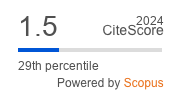Challenges and possibilities of digital games in mathematics teaching: a situational overview of recent years in Brazil
DOI:
https://doi.org/10.5753/jis.2024.4155Keywords:
Digital Games, Mathematics, TeachingAbstract
This paper is an extended version of the literature review already presented by the authors in SBGAMES 2023 and had as objective to investigate the possibilities and challenges that researchers face during the use of digital games in mathematics teaching in Brazilian basic education. The digital games, whether in Smartphone or Personal Computer, are example of activates that are part of the students’ life, and for being immersed in this universe they can have difficulties in the classroom, that’s why some teachers and researchers have tried to use the digital games in the classroom to make the classroom more comfortable for the students who are already immersed in the world of Information and Communication Technologies. The research object, the research string, the time, and the platforms on which the research would be conducted were defined. 129 studies were found, and after three steps of reading, six of them were selected for the data analysis. It was noticed that the students liked the activities conducted, because the game brought context to the concepts and turned possible that they could have a more open dialogue between them and with the teacher to take questions or explain the logics used to reach a certain result. It was also noted that they had challenges, but these were overcome with adaptations in the activities.
Downloads
References
Boito, P. and da Silva, J. T. (2020). Jogo minecraft como aliado no processo de ensino e aprendizagem da geometria espacial. RBECT: Revista Brasileira de Ensino de Ciência e Tecnologia, 13(3). DOI: https://dx.doi.org/10.3895/rbect.v13n3.9947.
Coutinho, C. P. (2014). Metodologia de investigação em ciências sociais e humanas: teoria e prática. Coimbra: Almedina.
Crawford, C. (1984). The Art of computer game design. Berkeley: Osborne/McGraw-Hill.
de Menezes, B. S. and de Fraga Sant’Ana, M. (2021). Ambientes de aprendizagem a partir do game jobmath. REMAT: Revista Eletrônica da Matemática, 7(2). DOI: https://doi.org/10.35819/remat2021v7i2id5313.
de Oliveira, C. A. and Ferreira, W. C. (2021). O jogo digital quiz pg nas aulas de matemática: possibilidades para o ensino e aprendizagem de progressão geométrica. Revista de Educação Matemática, 18. DOI: https://doi.org/10.37001/remat25269062v17id489.
Fernandes, K., Aranha, E., and Lucena, M. (2018). Estratégias para elaboração de game design de jogos digitais educativos: uma revisão sistemática. Anais do SBIE 2018 (Proceedings of the SBIE 2018), 27(2):585–594. DOI: https://doi.org/10.5753/cbie.sbie.2018.585.
Huizinga, J. (2012). Homo ludens: o jogo como elemento da cultura. São Paulo: Perspectiva, 7 edition.
Kirnew, L. C. P., Bianchini, L. G. B., da Costa, N. M. L., and Ventura, L. M. (2020). Ensino e aprendizagem da matemática por meio dos jogos digitais: uma proposta colaborativa no laboratório de informática. IEEM: Jornal Internacional de Estudos em Educação Matemática, 12(3). DOI: https://doi.org/10.17921/2176-5634.2020v13n3p343-352.
Mattar, J. (2009). Games em educação: como os nativos digitais aprendem. São Paulo: Pearson Prentice Hall.
Moita, F., Viana, L. H., and Santos, Y. A. (2019). O minecraft e o tangram no desenvolvimento do raciocínio lógico- matemático. Anais do SJEEC: XIII Seminário de Jogos Eletrônicos Educação e Comunicação, pages 276–285. [link] Accessed: 31 January 2024.
Moita, F. M. G. S. C., Luciano, A. P. C., Costa, A. T., and Barboza, W. F. C. (2013). Angry birds como contexto digital educativo para ensino e aprendizagem de conceitos matemáticos: relato de um projeto. Proceedings do XII Simpósio Brasileiro de Jogos e Entretenimento Digital (SBGames 2013). [link] Accessed: 31 January 2024.
Monteiro, I. T., Lourenço, E. L. d. Q., Brilhante, M. Q. d. L., de Freitas, A. T., Oliveira, F. C. d. M. B., de Castro, F. E. B., and de Oliveira, A. C. B. (2022). Design and evaluation of a prototype of a children’s educational application during and for the covid-19 pandemic and beyond. Journal on Interactive Systems, 13(1):54–76. DOI: https://doi.org/10.5753/jis.2022.2004.
Prensky, M. (2012). Aprendizagem baseada em jogos digitais. São Paulo: Senac.
Ritter, D. and Bulegon, A. M. (2022). Jogo digital contribuindo na compreensão das operações com números naturais e decimais. EMTEIA: Revista de Educação Matemática e Tecnologia Iberoamericana, 12. DOI: https://doi.org/10.51359/2177-9309.2021.248409.
Salen, K. and Zimmerman, E. (2012). Regras do jogo: fundamentos do design de jogos: principais conceitos: volume 1. São Paulo: Blucher.
Souza, J. G. R. d. and Prates, R. O. (2024). Identifying challenges for elementary school teachers in building digital games through a workshop. Journal on Interactive Systems, 15(1):362–374. DOI: https://doi.org/10.5753/jis.2024.3951.
Sucheck, F., da Rocha, M., and Kalinke, M. A. (2020). Práticas contemporâneas em educação matemática. Curitiba: Intersaberes.
Troian, A. C. (2021). A constituição do conhecimento matemático com o jogo digital autoral: Aventura em rhind. [link] Accessed: 31 January 2024.
Downloads
Published
How to Cite
Issue
Section
License
Copyright (c) 2024 Gilberto Batista Damaceno Júnior, Jesse Nery Filho, Maria Talita Rabelo Pinheiro

This work is licensed under a Creative Commons Attribution 4.0 International License.
JIS is free of charge for authors and readers, and all papers published by JIS follow the Creative Commons Attribution 4.0 International (CC BY 4.0) license.








